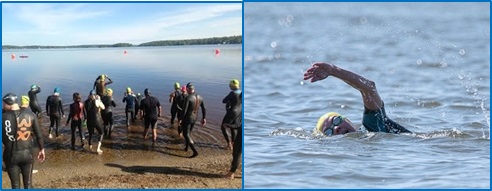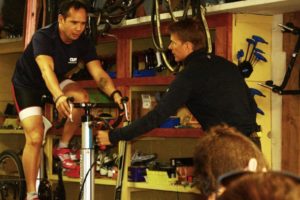Written by CLPT athlete Sandie Orlando
Some things you just have to learn the hard way. Through experience.
To be fair, there are articles that provide guidance about the need for things like chamois butter, body lubricants, washing heart rate monitor straps, drying out swim goggles and using the right detergent on cycling shorts. Typically, the articles are a series of bullet points or oblique reminders about not forgetting that ‘all-important’ item in your gear bag, with a discreet reference to what makes it all important.
As a relatively inexperienced triathlete, I’m more involved with mastering the catch in my swim and making a transition from road bike to tri bike to worry about the state of my gear. That is…until faced with the discomfort of why these things are, in fact, all important.
For those who are smart enough to learn from others’ mistakes (instead of NEEDING to experience it yourself to truly understand), here are the Top Ten lessons (with way too much information) I’ve had the pleasure of living, in full colour.
- Heart rate monitor straps need to be washed every so often. The build-up of sweat on the strap leaves a salty deposit which becomes hard. On your first warm weather, longer run…the strap will rub off all the body glide you’ve (hopefully) remembered to apply. You will become very aware of this when you get in the shower and experience the stinging of salt water running over some very raw parts of your skin. This takes weeks to heal up, even with liberal applications of Polysporin…especially if you continue to wear the strap. Turning it to another location does not fix the problem. It gives you two problems. Washing the strap is a good thing to do. Washing it too often will kill it. This is a good example of when reading the instructions makes good sense. (Addendum: accidentally flipping it into the toilet will ensure its final demise!)
- Swim goggles wear out. Then they leak. If you wear contacts, this is bad. Especially when the warm weather starts, and your gear bag sits in a hot car all day after your swim. Black stuff can start to grow inside the goggles. Yes – this is black mold, and it’s as gross as it sounds. If you don’t wash it out with diluted bleach…you will get an eye infection. Sometimes repeatedly, if you are too dense to figure out the cause of it the first time. Eye infections are really uncomfortable, prevent you from wearing contacts or make up, and make you look like you came off the set of the Walking Dead. Plus – you can’t swim until it clears up, and you replace your goggles. It pays to take care of them. Read the instructions!
- Nutrition – specifically gels – are meant to be taken over the course of a long run, not all at once when you suddenly realize you’ve been forgetting about them. Several in a row don’t go down so well. Or, more specifically – won’t stay in that long. If they aren’t coming back up (preferable) – they are exiting at the other end in one helluva hurry. There aren’t enough portalets in the last two kilometers of a race or long run to meet the needs of this situation. And no amount of Kegels will prepare you for staying in control. You will crap your pants.
- New shoes – At one point, or several points, if you don’t learn easily, you will be tempted by another shoe brand. Something in your head will convince you that changing your shoes might be a good thing, despite the fact that you’ve run in the same brand and model for years without issues. If you are lucky, it will work out. For the rest of us, it’s usually an exercise in discovering just how big a blood blister needs to be in order to leak through the fabric of the shoe and serve notice that you missed that hot spot developing. This gives a whole new meaning to running through pain.
- Sweat spots and chafing – New gear is always inspiring, but should be tested with caution. There is a reason most workout gear is black. Two, in fact. Sweat and indiscretion. Baby blue shorts and running bra look fantastic on the hanger. At the end of a hot run, when you have a distinct sweat pattern only in the crotch and around each nipple – it looks less fantastic. That only happens once before you learn to do the discreet water test in the change room before making a final decision. Chafing is another story, and can only be discovered through experience and a shower. Simple rule here – if that new kit chafes once…it will always chafe. Body glide will only help so much. Sometimes, you have to admit defeat and ditch it.
- Laundry – Too much detergent can cause cycling shorts to foam, and it will happen in the most indiscrete places. There are two reasons for sport specific detergent…removing stink, and not building up in your gear. It also comes with instructions for use – worth observing. Good thing it’s more expensive so you pay attention to using it sparingly. Built up stink from gear that was left in the gym bag in your car in the heat along with your swim goggles will develop bacteria that becomes ‘one’ with the fabric. A simple wash doesn’t take care of it. Fortunately, there are sports detergents designed to help remove that embedded odor…if you follow the instructions. (Sports Suds is a great brand, is eco-friendly and comes with a little spoon to measure it sparingly.) Sometimes, admitting defeat is the only option. In that case, refer to Sweat Spots and Chafing before shopping.
- Unloading while on the bike – At some point in a long ride, it becomes evident that tissues are a wasted effort, and it becomes necessary to spit and blow your nose with less delicacy. This is when learning the art of the moving hork or snot rocket is practical. Newbies generally under-fire or miscalculate the wind direction and end up wearing it. More advanced, but less socially aware athletes will forget to check for their training mates (or illegal drafters) and pay it backwards. It’s worth keeping in mind that the very experienced have mastered both skills, and have an additional talent they can deploy. They’ve learned how to pee on the bike!
- Technology forms a love/hate relationship with you, and not the other way around. Despite your best efforts to master your Garmin settings, keep it charged up, and install updates – there will be days that it will simply not cooperate. You must wait for the signal. You must start and restart it to convince it to pick up your cadence and speed and heart rate meters. You must decide which of the three you don’t care about anymore so you can get on with it. Most importantly, you must be able to say F**It and carry on without the technology. Sometimes it messes with your head enough to throw off your workout. Or your day. Or week…if you haven’t figured it out before trying to do the next workout. Sometimes the only option is to break up for a while and leave it at home until you both feel ready to try again, with a fresh attitude.
- Cosmetics don’t matter anymore. Coordinated clothing is a luxury for rest days. Hair color is pointless – it gets stripped out after the second pool session. Heels and pretty shoes become dust collectors. Bras and underwear become optional more frequently than we will admit. Your gym bag becomes your purse. You become de-sensitized to stretching in public places, sitting in restaurants wearing stinky/sweaty/salted/snotty gear after a long ride. Weird tan lines don’t matter anymore. The only thing that comes close to preparing for this decline of personal dignity is having a baby!
- When dressed like a civilian, act like a civilian. – Don’t be fooled into thinking you can do a fast paced walk to a business meeting to make up for the short run you had to miss. First of all, it takes way longer than you think, and you will be late. And – you probably wore pretty shoes that will give you blisters, clothes that will show sweat stains, and are carrying a gym bag/purse that’s gets heavier by the minute. Some things are not meant to be part of your training.
On that note, although training consumes most of your waking hours, and some that are supposed to be part of your sleeping hours, there are times when it needs to be set aside. Maintaining relationships with partners, family and friends is also important. You’ll need them for perspective and support. Plus, who else will laugh with you as you discover your Top Ten lessons the hard way?



